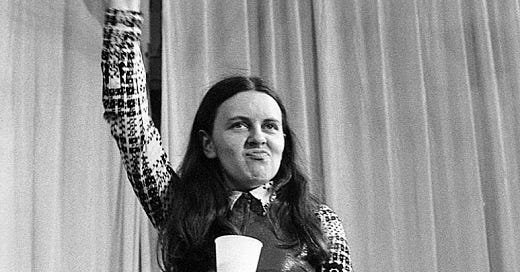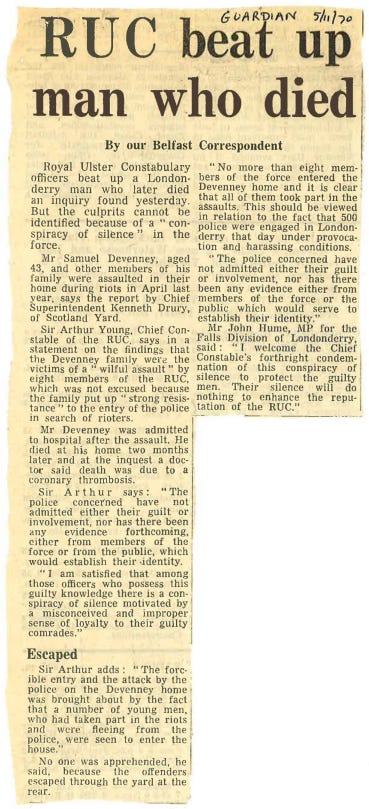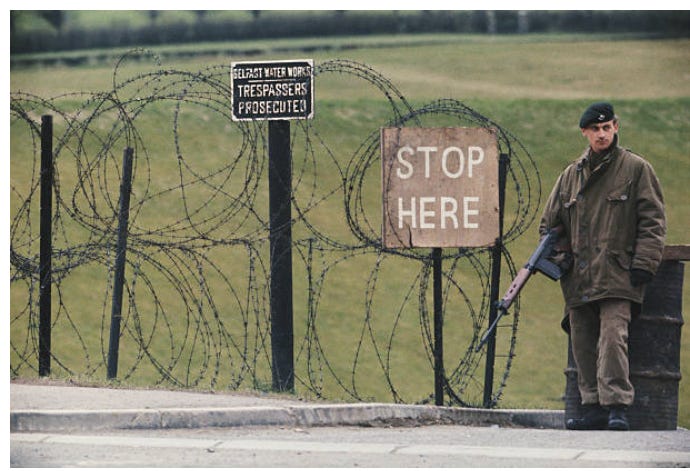In April 1969, Alexander Dubček was forced to resign as the first secretary of Czechoslovakia's Communist Party. April seemed to be a month of resignations, with Terence O’Neill also resigning as Prime Minister of Northern Ireland.
On the 4th of April, there was an explosion at a water installation at Dunadry, County Antrim, one of the main water supply pipes that linked Lough Neagh to Belfast. It was later reported that the bomb was planted by Loyalists who were members of the UVF and the UPV. This may have confirmed the beliefs of Terence O’Neill, where, only a week earlier, at the bombing at an electricity substation at Castlereagh, when asked about the Special Branch’s assessment blaming the IRA, he said;
"Oh, I don't think so, I think this is some of my own people trying to tell me to go,"
On the 17th of April, the Mid Ulster by-election was held following the death of George Forrest, the Ulster Unionist Party Member of Parliament for Mid Ulster.
The two-way contest was unusual in featuring two female candidates. The Ulster Unionist Party stood Anna Forrest, George Forrest's widow. She did not hold any public meetings or do any electioneering work. In a brief address to electors, she stated;
"if elected, I will endeavour, with God's help, to strive for a more peaceful and prosperous society where all people can live in harmony and work together for the common good of all."
Bernadette Devlin stood as a Unity candidate in Mid-Ulster, and in contrast to Mitchell's abstentionist stance, she committed to attending the British House of Commons to fight her cause.
Devlin won the contest, and, at only 21 years of age, she became the youngest woman ever to be elected as a Member of Parliament (MP).
On the 19th of April, there was more rioting in the Bogside area of Derry following clashes between Northern Ireland Civil Rights Association (NICRA) marchers, Loyalists and members of the RUC. Several RUC officers entered the house of Samuel Devenny, 43, who had not been involved in the disturbances, and severely beat him with batons causing internal injuries and a subsequent heart attack. Several other people in the house were also beaten by the police including Devenny's 16-year-old and 18-year-old daughters. Samuel Devenny died on 17 July 1969, reportedly, as a result of his injuries. Below is a news clipping from The Guardian.
The 20th of April had seen two further explosions; one at Silent Valley reservoir in County Down cutting off water supplies to Belfast, and the other at an electricity pylon at Kilmore, County Armagh. Similar to the first explosion earlier in the month, these were also blamed on the IRA, however, it was reported later that the UVF and UPV were responsible.
Following these, and earlier attacks on other installations, the Ministry of Defence in London announced that British troops (ones already stationed in the region) would be used in Northern Ireland to guard key public installations. The announcement was made in response to a request from the Northern Ireland government.
April 22nd had seen Bernadette Devlin make her, somewhat controversial, maiden speech in the House of Commons;
“I remind the honourable Member for Londonderry (James Chichester-Clark) that I too was in the Bogside area on the night that he was there. As the honourable gentleman rightly said, there never was born an Englishman who understands the Irish people. A man who is alien to the ordinary working Irish people cannot understand them, and I therefore respectfully suggest that the honourable gentleman has no understanding of my people, because Catholics and Protestants are the ordinary people, the oppressed people from whom I come and whom I represent…
We came to the situation in Derry when the people had had enough. Since October 5th, it has been the unashamed and deliberate policy of the Unionist Government to try to force an image of the civil rights movement that it was nothing more than a Catholic uprising. The people in the movement have struggled desperately to overcome that image – but it is impossible when the ruling minority are the government, and control not only political matters but the so-called impartial forces of law and order. It is impossible then for us to state quite fairly where we stand.
How can we say that we are a non-sectarian movement and are for the rights of both Catholics and Protestants when, clearly, we are beaten into the Catholic areas? Never have we been beaten into the Protestant areas. When the students marched from Belfast to Derry, there was a predominant number 283 of Protestants. The number of non-Catholics was greater than the number of Catholics. Nevertheless, we were still beaten into the Catholic area because it was in the interests of the minority and the Unionist Party to establish that we were nothing more than a Catholic uprising – just as it is in the interest of the honourable Member for Londonderry to come up with all this tripe about the IRA…
The Unionist policy has always been to divide the people who are dependent upon them. The question of voting is tied up mainly with the question of housing, and this is something which the House has failed to understand. The people of Northern Ireland want votes not for the sake of voting but for the sake of being able to exercise democratic rights over the controlling powers of their own areas. The present system operates in such a way that Unionist-controlled councils and even Nationalist-controlled councils discriminate against those in their areas who are in the minority…
There is no denying that the problem and the reason for this situation in Northern Ireland is social and economic because the people of Northern Ireland are being oppressed not only by a Tory Government, a misruling Tory Government and an absolutely corrupt, bigoted and self-interested Tory Government, but by a Tory Government of whom even the Tories in this House ought to be ashamed and from which they should dissociate themselves.
I should like in conclusion to take a brief look at the future. This is where the question of British troops arises. The question before this House – in view of the apathy, neglect and lack of understanding which this House has shown to these people in Ulster – is how in the shortest space it can make up for 50 years of neglect, apathy and lack of understanding. Short of producing miracles, such as factories overnight in Derry and homes overnight in practically every area, what can we do?
If British troops are sent in I should not like to be either the mother or sister of an unfortunate soldier stationed there. The honourable member… may talk ’till Domesday about “our boys in khaki”, but it has to be recognised that the one point in common among Ulstermen is that they are not very fond of Englishmen who tell them what to do.”
On the 23rd of April 1969, the Unionist Parliamentary Party voted by 28 to 22 to introduce universal adult suffrage in local government elections in Northern Ireland. The demand for 'one man, one vote' had been one of the most powerful slogans of the civil rights movement. James Chichester-Clark, then Minister of Agriculture, resigned in protest at the reform. This move seemed to further undermine the position of Terence O'Neill.
From the 24th to the 26th of April had seen two further bombings on water supplies in Northern Ireland. The first (24th of April) was an explosion at a water pipeline between Lough Neagh and Belfast, whilst the second (26th of April) was at a water pipeline carrying supplies to Belfast that had left much of Belfast without water.
Overall, there were 5 bombings in April 1969, and given that Terence O’Neill was unable to regain the confidence of the Unionist party, he resigned to be replaced later by James Chichester-Clark.







